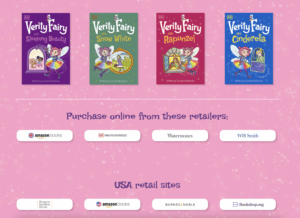Build Your Author Website
Published on 05/09/2023Build Your Author Website
Teacher: ITSme Society
Most artists have online portfolios to showcase their work, and so should authors!
All authors, published or unpublished, should have websites to share their writing journey, showcase their work, and allow others to learn more about them. Are you an author? If so an author website offers many benefits, helping you make connections in the industry and keep your readers up to date.
 Benefits for Published Authors
Benefits for Published Authors
For published authors, your website is a platform to direct sales to your books and connect more with your readers. Readers are likely to look for more books by an author they like and your website can give them an easy place to find them! Make sure to include links to buy your books. Your website is also a great place to tease what’s next. Let people know what you are working on and get them excited! This connection with your readers is great to help you promote your work. Even professionally published authors often need to do the bulk of promotion for their books themselves.
Benefits for Unpublished Authors
If you haven’t been published yet, your website can help you start building connections in the industry. It is a place for agents and publishers to learn more about you, your writing style, and read samples of your work. These should be short samples, poems, short stories, or excerpts from longer works. This will give them an understanding of your skill and help them decide if your work is a fit for their agency or publishing house.
What You Should Include
Published or unpublished, there are a few things you definitely need on your author website. Aside from your books or writing samples mentioned above, your website should have a short bio, information about your writing, and links to your social media.
Your biography:
Your bio can be pretty short, with just a little information about where you are from, anything unique about you, any big projects you were involved in, or past relevant education. The information about your writing should be longer and include, the types of books you write (fiction, nonfiction, children’s books, YA), any genres you enjoy writing (mystery, thriller, romance, fantasy), what inspires you, what you hope people can get from your books, and anything else about how and what you write. This is the space for people to understand more about what they can expect from your work.
 Social media:
Social media:
Including links to your other social media accounts will help people find you other places. Your social media will also come in handy when sharing your website. Just setting up your website won’t get you the connections you want. Now you have to share your website with everyone. Share your website on social media, send it to your agent, to your friends, share it when you go to events, and anywhere else you can.
Contact page:
A contact page tells people the best way to reach you. You can either have your email address, a form for people to fill out, or both. This is also where you can include the links to your social media sites.
Updating Your Website
Now that your website is set up and shared, you will need to update it every so often to give people a reason to keep coming back. You can write blogs, share writing tips or worksheets, or other unique content. These things will keep people coming back, and help you build strong connections.
At the end of the day, make sure not to stress about updating your website. Only update it when you have something to share. Every few months is fine, especially if you are just starting out. After you post new content make sure to share your updates via social media to get it out to more people, and attract people back to your site!
For more free tips for how to improve your writing for children’s books subscribe to our ITSme Learning Newsletter!
Other News
What Happens in an ITSme Mentorship? A Week-by-Week Breakdown
Imagine having a guide who not only understands the creative path an individual wants to walk, but also has the knowledge and tools to help them get there – successfully. That’s the core of the ITSme Learning Mentorship. Whether someone is a student, a young professional at the beginning of their career, or an artist…
Announcing Our Very First Picture Book Course!
We are extremely excited to announce our first picture book class and mentorship program, in a collaboration between Caroline Wakeman Literary Agency and multi-talented author-illustrator Sally Anne Garland. Your Picture Book Journey: How to Write and Illustrate Your Own Picture Book is a 12-week course for writers, illustrators, and visual storytellers ready to bring their…
Why Every Illustrator Portfolio Needs a Stand-Out Character (Yes, Even Yours)
When you’re thinking about our favourite stories as a child, we often think about the narrative, the themes, perhaps a particular quote that stood out, but the most memorable elements are always the characters. The reason the characters always stay in our minds is because they are the gateway to the narrative, and all of…
Trend Watch: YA Illustrated Covers
Over the past few years, illustrated covers have become a defining visual language in the Young Adult (YA) and New Adult (NA) book market. And no, this isn’t just a passing trend—it’s a design evolution powered by the viral force of #BookTok, #bookgirlies, and a growing appetite for genre-fluid storytelling. Hear what’s driving the…
Trend Watch: The Graphic Novel Boom
Every week we’ll be featuring a new article over on LinkedIn, in our new trend watch series! Graphic novels are having a moment—and it’s no passing trend. From classrooms to bestseller lists, graphic novels are dominating shelves and reading time across all ages. What was once seen as a niche format with a distinct, heavy-lined “comic book”…
Bologna 2025: A Week of Connection
By: Vicky Patoulioti, Talent Source Manager, ITSme This year’s Bologna Children’s Book Fair was one to remember. From early mornings to late evenings, our team Vicky, Bhavi, Ed, and Emily — were on the ground offering free portfolio reviews to artists from all over the world. Mornings kicked off with pre-scheduled reviews, while in the…




